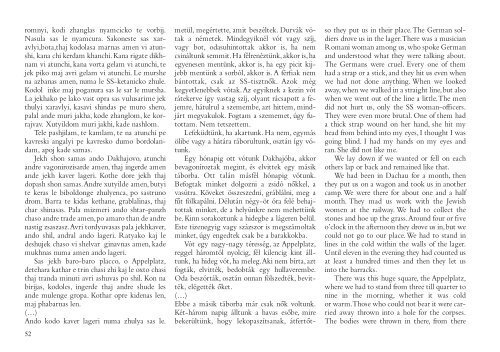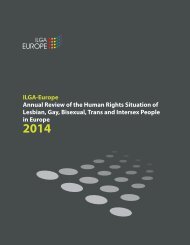You also want an ePaper? Increase the reach of your titles
YUMPU automatically turns print PDFs into web optimized ePapers that Google loves.
omnyi, kodi zhanglas nyamcicko te vorbij.<br />
Nasula sas le nyamcura. Sakoneste sas xaravlyi,bota,thaj<br />
kodolasa marnas amen vi atunshi,<br />
kana chi kerdam khanchi. Kana rigate dikh -<br />
nam vi atunchi, kana vorta gelam vi atunchi, te<br />
jek piko maj avri gelam vi atunchi. Le murshe<br />
na azbanas amen, numa le SS-ketanicko zhule.<br />
Kodol inke maj poganura sas le sar le mursha.<br />
La jekhako pe lako vast opra sas vulusarime jek<br />
thulyi xaravlyi, kasavi shindas pe muro shero,<br />
palal ande muri jakha, kode zhang lom, ke korrajvav.<br />
Xutyildom muri ja khi, kade nashlom.<br />
Tele pashjilam, te kamlam, te na atunchi pe<br />
kavreski angalyi pe kavresko dumo bordolandam,<br />
apoj kade samas.<br />
Jekh shon samas ando Dakhajovo, atunchi<br />
andre vagonirozisarde amen, thaj ingerde amen<br />
ande jekh kaver lageri. Kothe dore jekh thaj<br />
dopash shon samas. Andre xutyilde amen, butyi<br />
te keras le biboldonge zhulyenca, po sastruno<br />
drom. Barra te kidas kethane, grablalinas, thaj<br />
char shinasas. Pala mizmeri ando shtar-panzh<br />
chaso andre trade amen, po amaro than de andre<br />
nastig zsaszasz. Avri tordyuvasas pala jekhkaver,<br />
ando shil, andral ando lageri. Ra tyako kaj le<br />
deshujek chaso vi shelvar ginavnas amen, kade<br />
mukhnas numa amen ando lageri.<br />
Sas jekh baro-baro placco, o Appelplatz,<br />
detehara kathar e trin chasi zhi kaj le oxto chasi<br />
thaj tranda minuti avri ashuvas po shil. Kon na<br />
birijas, kodoles, ingerde thaj andre shude les<br />
ande mulenge gropa. Kothar opre kidenas len,<br />
maj phabarnas len.<br />
(…)<br />
Ando kodo kaver lageri numa zhulya sas le.<br />
52<br />
metül, megértette, amit beszéltek. Durvák vó -<br />
tak a németek. Mindegyiknél vót vagy szíj,<br />
vagy bot, odasuhintottak akkor is, ha nem<br />
csináltunk semmit. Ha félrenéztünk, akkor is, ha<br />
egyenesen mentünk, akkor is, ha egy picit kijjebb<br />
mentünk a sorból, akkor is. A férfiak nem<br />
bántottak, csak az SS-tisztnôk. Azok még<br />
kegyetlenebbek vótak. Az egyiknek a kezin vót<br />
rátekerve így vastag szíj, olyant rácsapott a fe -<br />
jemre, hátulrul a szemembe, azt hittem, mind -<br />
járt megvakulok. Fogtam a szememet, úgy fu -<br />
tottam. Nem tetszettem.<br />
Lefeküdtünk, ha akartunk. Ha nem, egymás<br />
ölibe vagy a hátára ráborultunk, osztán így vó -<br />
tunk.<br />
Egy hónapig ott vótunk Dakhajóba, akkor<br />
be vagoníroztak megint, és elvittek egy másik<br />
tá bor ba. Ott talán másfél hónapig vótunk.<br />
Befog tak minket dolgozni a zsidó nôkkel, a<br />
vasútra. Köveket összeszedni, gráblálni, meg a<br />
fût fölkapálni. Délután négy-öt óra felé behajtottak<br />
minket, de a helyünkre nem mehettünk<br />
be. Kinn sorakoztunk a hidegbe a lágeren belül.<br />
Este tizenegyig vagy százszor is megszámoltak<br />
minket, úgy engedtek csak be a barakkokba.<br />
Vót egy nagy-nagy téresség, az Appelplatz,<br />
reggel háromtól nyolcig, fél kilencig kint álltunk,<br />
ha hideg vót, ha meleg. Aki nem bírta, azt<br />
fogták, elvitték, bedobták egy hullaverembe.<br />
Oda beszórták, osztán onnan fölszedték, bevitték,<br />
elégették ôket.<br />
(…)<br />
Ebbe a másik táborba már csak nôk voltunk.<br />
Két-három napig álltunk a havas esôbe, mire<br />
bekerültünk, hogy lekopaszítsanak, átfertôt -<br />
so they put us in their place. The German soldiers<br />
drove us in the lager. There was a musician<br />
Romani woman among us, who spoke German<br />
and understood what they were talking about.<br />
The Germans were cruel. Every one of them<br />
had a strap or a stick, and they hit us even when<br />
we had not done anything. When we looked<br />
away, when we walked in a straight line, but also<br />
when we went out of the line a little. The men<br />
did not hurt us, only the SS woman-officers.<br />
They were even more brutal. One of them had<br />
a thick strap wound on her hand, she hit my<br />
head from behind into my eyes, I thought I was<br />
going blind. I had my hands on my eyes and<br />
ran. She did not like me.<br />
We lay down if we wanted or fell on each<br />
others lap or back and remained like that.<br />
We had been in Dachau for a month, then<br />
they put us on a wagon and took us in another<br />
camp. We were there for about one and a half<br />
month. They mad us work with the Jewish<br />
women at the railway. We had to collect the<br />
stones and hoe up the grass. Around four or five<br />
o’clock in the afternoon they drove us in, but we<br />
could not go to our place. We had to stand in<br />
lines in the cold within the walls of the lager.<br />
Until eleven in the evening they had counted us<br />
at least a hundred times and then they let us<br />
into the barracks.<br />
There was this huge square, the Appel platz,<br />
where we had to stand from three till quarter to<br />
nine in the morning, whether it was cold<br />
or warm. Those who could not bear it were carried<br />
away thrown into a hole for the corpses.<br />
The bodies were thrown in there, from there



